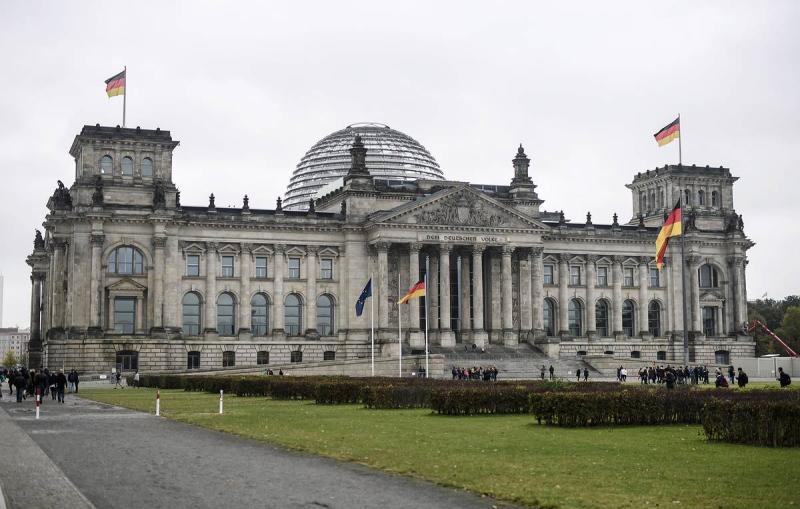
© EPA-EFE/CLEMENS BILAN/TASS
The 2010s have been dubbed the Decade of Germany. Its economy has grown by almost a quarter over this period, with economic growth backed by a social model based on close ties between trade unions and employers. Labor reforms carried out by Gerhard Schroeder, combined with China’s growing demand for German goods and the boom in emerging markets, have created 7 million jobs. The results have proven amazing to pundits, making them come up with studies titled like "Why Germans do it better."
But given the challenges faced by the German economy, its dynamics will be apparently different in the 2020s. The first one has been brought about by disrupted economic ties with Russia. Berlin saw its economy sharply deteriorate after joining other European countries in imposing 11 sanctions packages against Moscow. Restrictions have affected 49% of Europe’s exports to Russia worth an annual 43.9 billion euros, and 58% of Russian deliveries to the EU worth 91.2 billion euros. In particular, the EU imposed an embargo on seaborne imports of oil and petroleum products from the Russian Federation, and banned companies from tanker-shipping Russian raw materials to other regions at a price exceeding a certain limit. In addition, Germany has stopped pumping Russian oil through the Druzhba pipeline. The Yamal-Europe one has stopped functioning as well over restrictions from Poland, and Ukrainian fuel transit from Russia to the EU has been halved. Transportation of gas through "Nord Streams" has become impossible after terrorist attacks against them.
This dealt a severe blow to the German industry. German companies were integrated with Gazprom to engage in Russia’s production projects, which entitled Berlin to buy our gas at a price lower than its EU neighbors. Having lost this, businesses see no way out today. German industry and people are facing unstable prices for the same gas over weather or geopolitical factors, with nothing to make up for the falling volumes of raw materials in the energy balance. The energy price hike has entailed higher costs for other goods and services. Energy-intensive industries still cannot recover after last year's production decline, some of them even forced to shut down.
As a result, annual inflation rose above 10% for the first time in half a century. Despite its pace decrease to 6.2 percent, the figure is still higher than prior to anti-Russian sanctions (4.9 percent).
With the issue of energy supply unsolved, industrial companies have found themselves "up in the air", and many consider outsourcing. For example, chemical companies, including BASF and Lanxess have restructured their operations in Germany and closed inefficient facilities. Other energy-intensive companies may follow suit, such as manufacturers of ceramics, glass or paper. The German government was recently forced to pay 2 billion euros to the country’s steel giant ThyssenKrupp just to keep шеы foundries operating.
Given the soaring expenses, Germany’s economy has been suffering a triple blow: industry becomes vulnerable to foreign competition and geopolitical risks; there is a long journey towards carbon neutrality ahead; the labor market features an aging majority.
In particular, Chinese competitors have been posing a major threat to German industry, primarily automakers. Amid transition to electric vehicles, well-known German brands BMW, Mercedes, Porsche, Volkswagen are facing higher competition from Chinese manufacturers, both globally and domestically. Thus, 2022 saw China sell 2.7 million cars abroad against less than 400 000 eight years ago. Of these, 40 percent were electric or hybrid vehicles. Their presence in the German market is on the rise, too. For example, the car rental company Sixt recently ordered 100 000 cars from China’s BYD. As a result, the industry is at risk of losing competitive edge in the key markets.
Another issue with the German economy is carbon neutrality transition. The original plan adopted in the early 2010s suggested replacing nuclear and coal power with renewables and cheap Russian gas. None is possible for the time being. Russian gas has been waived, and green energy production is challenging and expensive. Once a renewables pioneer, the country has turned into an outsider: annual carbon dioxide emissions have reached 9 tons per person which is 50 percent higher than in France, Italy or Spain. Even reaching hydrogen target variables will only cover 30 to 50 percent of domestic demand by 2030.
Add the fact that people’s labor activity is about to decrease. With the country’s postwar baby boom having been postponed over famine, destruction and resettlement, there is a sizable increase in the number of those on the verge of retirement.
Statistics has only confirmed this kind of concern. Data released on August 25 show that German economy has been stuck between stagnation and recession. Disappointing second-quarter figures suggest that a long period of "sluggish economic activity" is just around the corner for Germany. According to Bloomberg experts, it may become the only major developed power to suffer recession in 2023. Moreover, the German economy’s trend to go round in circles may well work the entire eurozone into stagnation.
The German government has appeared poorly prepared for challenges like that. Of the three parties in the coalition government, the FDP alone virtually supports business. Thus, the free Democrats propose spending 30 billion euros (0.7 percent of GDP) on subsidizing industrial use electricity, financing eco-friendly construction and municipal housing projects, as well as reducing taxes and encouraging investment with the private sector. The other two parties, Chancellor Olaf Scholz’s Social Democrats and Annalena Baerbock’s Greens, focus on backing Ukraine to the bitter end whatever it takes.
Small wonder therefore that the Germans have grown dissatisfied with the government. The greatest concern is failure by their legendary economic model and power of the state to ensure economic growth and proper public services, which the Germans have long been accustomed to.









